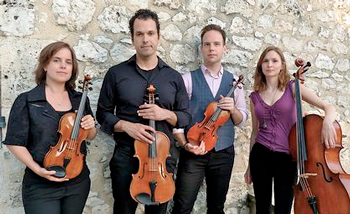by Mike Telin

But violinists Olivia de Prato and Joshua Modney, violist Victor Lowrie, and cellist Mariel Roberts are so adroit at this literature, it’s as if you were hearing these instruments played in the manner for which they have always been intended. Each of the repertoire choices was tailor made for the intimate and acoustically pleasing Transformer Station. The decision to perform in the center of the gallery, with the capacity audience surrounding the players, only added to the allure of the evening.
The concert, part of the Cleveland Museum of Art’s Performing Arts series, began with the String Quartet no. 3 (2010) by the New York City-based composer and saxophonist Alex Mincek. The work’s subtitle, “lift – tilt – filter – split,” perfectly describes the piece. Its repeated musical motives, consisting of glissandos, circular bowing patterns and various styles of pizzicato that covered a dynamic range from the barely audible to the highest possible volume, are passed back and forth between the players. The results amounted to a musical version of keep-away. Violinist Joshua Modney’s long sustained harmonic that brought this physical and emotional piece to its conclusion was astonishing.
In contrast to the extreme dynamic ranges of the Mincek, Atmende Steine (2013) by Danish composer Martin Stauning is an introspective work that conjures up the bleakness of a Scandinavian winter. Never venturing beyond a mezzo-forte, the piece’s slow-moving harmonic structure, coupled with Stauning’s inventive use of color shifts and layering, gives this somewhat minimalist piece an unrelenting intensity. The Mivos were in complete technical control during its long sustained lines from beginning to end. This was a distinguished performance, and one so gripping that you could hear the audience exhale at its conclusion.
The final work on the program was Helmut Lachenmann’s String Quartet #3, ‘Grido.’ Lachenmann is an established composer who is well-known throughout the world. “I think this piece is a modern masterwork,” Lowrie said in a pre-concert interview for this publication. “All of the extended techniques that he pioneered are incorporated throughout the piece, but there is also a distinct underlayer of harmonies and melodies.”
This is a giant work, lasting 20 minutes, and it was clear that the Mivos do love the piece. They know it inside and out, having studied it with the composer as well as with the group for whom it was written, the famed Arditti Quartet. Many times a piece is referred to as a journey, but Lachenmann really does take listeners on a musical excursion unlike any other. The Mivos served as expert guides on that excursion, pointing up the many arresting features of its musical landscape.
Published on ClevelandClassical.com April 9, 2015.
Click here for a printable copy of this article


